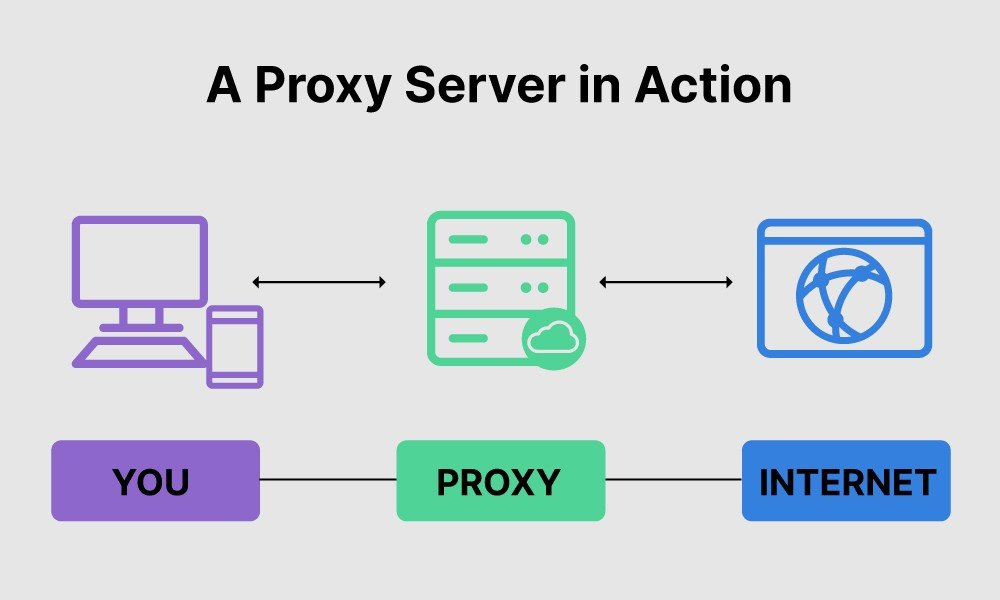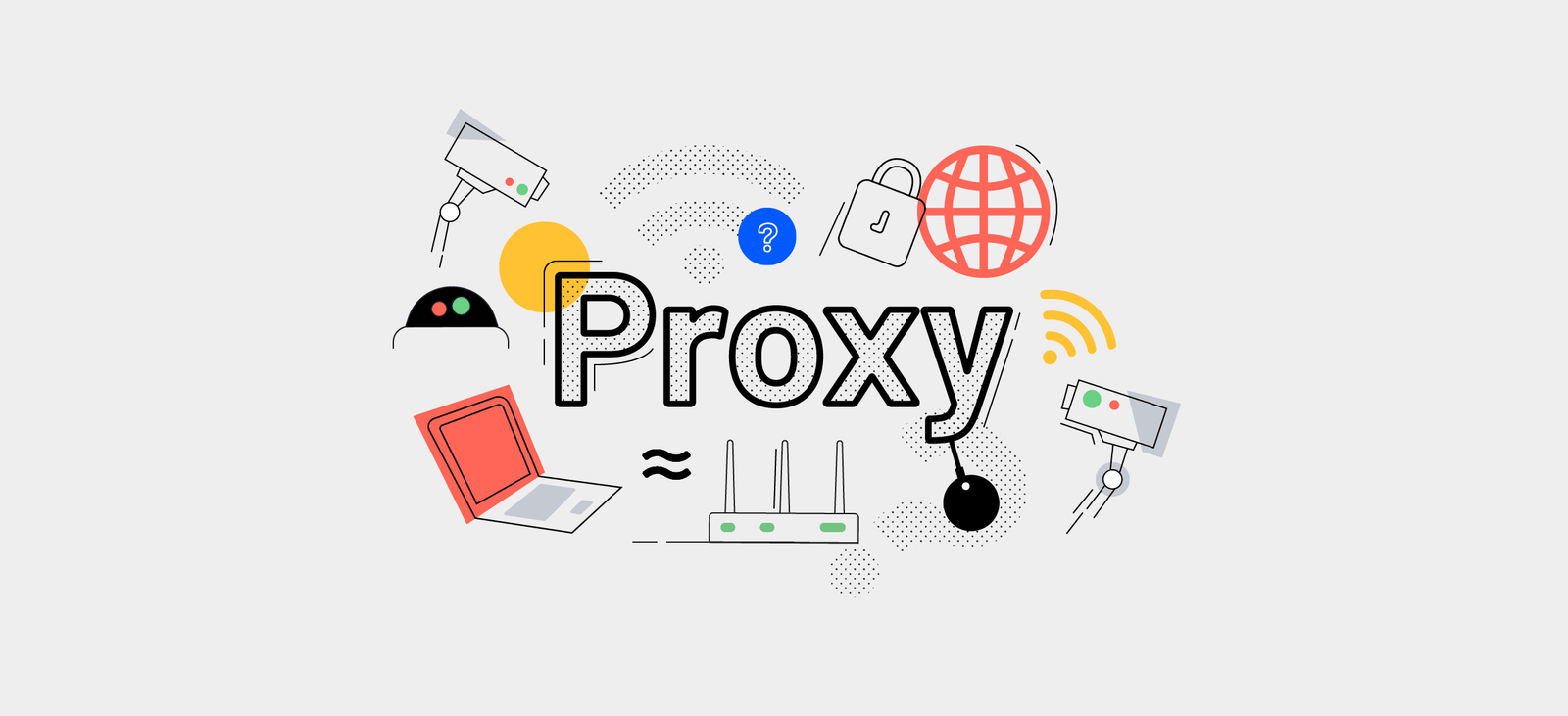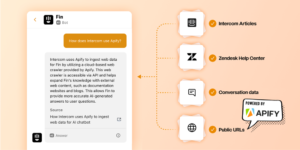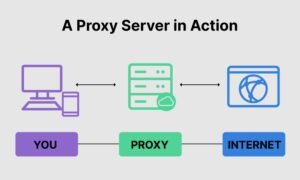In the expansive realm of the internet, where information traverses at the speed of light, the significance of a proxy server becomes paramount in safeguarding privacy, enhancing security, and optimizing efficiency. Whether you find yourself navigating the web casually, immersed in the intricacies of cybersecurity, or engaged in web scraping endeavors, gaining a profound understanding of what constitutes a proxy server and comprehending its operational intricacies is indispensable. This exhaustive guide aspires to demystify the realm of proxy servers, meticulously delving into their functionalities, advantages, and practical applications: An In-Depth Guide to Proxy Servers.

Table of Contents
What Does a Proxy Servers Do?
A proxy server acts as an intermediary between your device and the internet. Instead of connecting directly to a website or online service, your requests pass through the proxy server first. The proxy server then forwards those requests to the destination, and the responses follow the reverse path. This process provides several advantages:

- Privacy and Anonymity: By masking your IP address, a proxy server enhances your online privacy. Websites and services only see the IP address of the proxy server, keeping your real identity hidden.
- Security: Proxy servers act as a barrier between your device and the internet, offering an additional layer of security. They can filter out malicious content and block access to potentially harmful websites.
- Content Filtering: Organizations often use proxy servers to control and monitor internet access. They can implement content filtering policies to restrict access to certain websites or types of content.
How Can I Use Proxy Servers?
Using a proxy server involves configuring your device or software to route internet traffic through the proxy. Here are common use cases:
- Browsing Anonymously: Individuals concerned about online privacy can use proxies to browse the internet anonymously, keeping their real IP addresses hidden.
- Accessing Geo-Restricted Content: Proxy servers with IP addresses from specific regions enable users to access content restricted to those regions, overcoming geo-blocking.
- Web Scraping: Professionals engaged in web scraping leverage proxies to make multiple requests to a website without revealing their actual IP addresses, preventing IP bans.
How Do I Set Up a Proxy Server?
Setting up a proxy server involves configuring your device or software to use the proxy. The steps may vary based on the device and operating system. Generally, you’ll need the IP address and port number of the proxy server. Proxy settings can be configured in browsers, operating systems, or specific applications.

Types of Proxy Servers
Several types of proxy servers cater to different needs:
- HTTP Proxies: Primarily used for web browsing, these proxies handle HTTP traffic.
- HTTPS Proxies: Similar to HTTP proxies but designed for secure HTTPS connections, offering encrypted communication.
- SOCKS Proxies: Support various types of traffic, making them versatile for different applications.
- Transparent Proxies: Reveal the fact that they are being used and don’t add an extra layer of anonymity.
- Residential Proxies: Use IP addresses assigned by internet service providers to homes, making them appear as if they come from real users.
VPNs vs. Proxy Servers
While both VPNs (Virtual Private Networks) and proxy servers offer privacy and security, they operate differently. VPNs encrypt all internet traffic, providing a secure tunnel, while proxies selectively route specific types of traffic.
Why Use a Proxy for Web Scraping?
Web scraping involves making multiple requests to a website to extract data. Using a proxy for web scraping offers several advantages:
- Avoid IP Bans: Websites may block IP addresses if they detect excessive traffic. Proxies help rotate IP addresses, preventing bans.
- Anonymity: Proxies hide the real IP address of the scraper, ensuring anonymity during scraping activities.
- Access Geo-Restricted Data: Proxies with IP addresses from different regions enable scraping data that may be restricted based on geographical locations.
How Can Apify Help?
Apify is a comprehensive platform that provides solutions for web scraping and automation. Apify Proxy, part of the Apify ecosystem, allows users to smartly rotate datacenter and residential IP addresses. It offers:
- High-Performance Proxies: Apify Proxy ensures fast and reliable connections for web scraping activities.
- Developer Features: Apify is more than just a proxy solution. It’s a web scraping platform offering serverless computation, data storage, distributed queues, and a collection of web scraping APIs built by developers.
- Integration with Crawlee: Apify integrates seamlessly with Crawlee, an open-source web scraping library. This integration enhances proxy efficiency and protects them from burning out, saving developers money in the long run.
In conclusion, understanding the role of proxy servers is crucial for anyone navigating the complexities of the online world. Whether you’re prioritizing privacy, security, or efficient web scraping, incorporating proxy servers into your internet activities can open up a world of possibilities. Apify, with its advanced features and developer-friendly approach, stands as a reliable companion for those seeking a robust solution for web scraping and proxy management.




